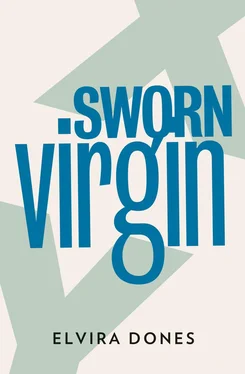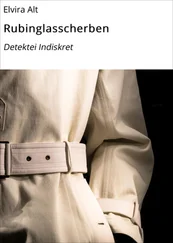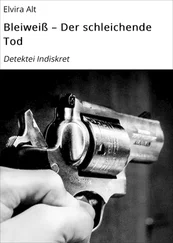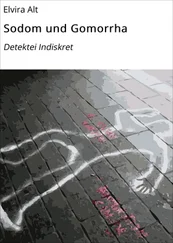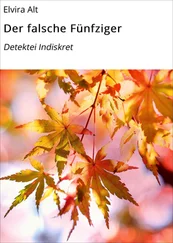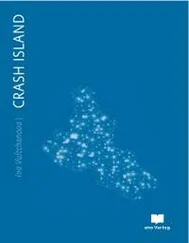The idea of lying down on the bed is inviting, Hana thinks. What is the village doing now? What is every one of its 280 inhabitants thinking at this precise moment?
‘Come on, bedtime! I’m dying,’ orders Lila.
‘I feel tender,’ Hana says.
The stones in the river at Rrnajë looked like foam. She had observed them, in her meticulous and disciplined way. Then she had understood. They looked like foam because they were white, too white at times, when water danced over them in a fury. Hana didn’t like fury: it tarnished her peace. Even the mountains’ name left her ambivalent: Bjeshkët e Namuna, the ‘cursed mountains.’ The name was too definitive; it left so little room for hope. And yet, close up, the mountains were tame, you just needed to know how to take them. You just needed to learn to sleep there without thinking of the name, a name made up by an outsider, some traveler who knew nothing about the place. There’s no curse, just caution and silence. If you don’t attack them, the mountains, they’ll leave you alone.
She wakes at one in the afternoon and stays in bed a little longer. Then she gets up and looks furtively down the narrow hallway. The apartment smells of lemon, sugar, and coffee. Her imitation Samsonite suitcase, bought in the bazaar behind the great mosque in Scutari, has disappeared, and so have Shtjefën’s shoes.
Lila comes out of the bathroom, smiling and busy. Hana pauses and pats the top of her head, suddenly feeling naked.
‘Good morning!’ Lila greets her. ‘Why are you patting your hair?’
‘I dreamed they were shaving my hair off on sheep-shearing day.’
Lila laughs hesitantly to start with, then her laugh grows, in a crescendo she doesn’t hold back. Hana follows suit, comfortable in her funny baggy pajamas. Lila goes on laughing, and then she pushes Hana into the living room. On the table there’s a feast. Hana decides she must first stop in the bathroom, where a new toothbrush and tube of toothpaste await her, together with various little bottles and unfamiliar paraphernalia. Beautiful towels. She stares at them at length; she’s afraid to use them, she doesn’t want to ruin them.
A year before, back at the village, Maria had received six towels like these from her daughter, who had emigrated to Italy. She had sewn them together and made curtains for the guest room. They were nice curtains: they went well with the rifles hanging in a row along the wall. Ten generations of the Frangaj family men ranged across the wall. No male voice had been heard in that house for a decade, since the blood feud had taken away the last of the Frangaj men, Maria’s son. If she had accepted the offers made by foreigners passing through the mountains after the communists fell she could have made a fortune selling those rifles. But she never had.
She washes quickly and comes out of the bathroom with her face still wet. Lila is pouring the coffee. Hana decides to light up a cigarette. They sit in silence.
Now, in the daylight, the apartment looks beautiful.
‘They say that you’ve been getting stranger and stranger,’ Lila says, more to herself than to her cousin. ‘They say you spend your time writing and reading.’
Greenish smoke plays around Lila’s curls.
‘Does that scare you, Lila? I mean, the fact that I’m weird?’
Lila doesn’t say a word.
‘I took the animals out, I chopped the wood, I worked in the fields, I went to the village meetings and I drank a lot of raki. Nothing else counts.’
‘But this morning, who are you?’ Lila asks cautiously. ‘Have you decided to be Hana or Mark?’
Whatever happened the day after her arrival, Hana had promised herself she would not regret it. She had never regretted anything and she wasn’t about to start now, at the age of thirty-four.
‘For you, I’m Hana. For the others I’ll still be Mark for a while.’
‘Ok.’
‘Ok what?’
‘You’re Mark. I have to treat you like a man.’
‘I told you that for you I’m the same old Hana. Yesterday that’s what you called me. What’s making you change your mind?’
Lila explains that this morning she looks like a man: her dark skin, her morning hair, those baggy pajamas, her yellow teeth, her masculine gestures. She finds it hard to think of her as a woman. Hana plays for time. It’s strange, but hearing those words hurts. On the table there are those buns with a hole in the middle, three little jam jars, butter, orange juice, coffee, sugar, hard-boiled eggs. Stop making an inventory, she tells herself.
‘I’ve been a man for fourteen years.’
Lila tries to drown her gaze in the oily dregs of the coffee.
‘It’s not going to be easy,’ she says finally. ‘Not for any of us.’
‘Really?’ Hana says, with a hint of a smile. ‘I didn’t know that.’
‘Don’t start now. You’re the one with the education here. I just say what comes into my head.’
Lila checks the clock on the wall impatiently. It’s nearly two o’clock.
‘I’m as ignorant as an ameba,’ Hana says. ‘Education is a big word.’
‘Well, you went to college, didn’t you?’
‘Yeah, but only for a year, before going up into the mountains and becoming a man.’
‘Well, I’m a cleaning lady, my dear.’
‘You were the top student in high school.’
Lila starts laughing. ‘And you’re the biggest liar in the northern hemisphere.’
Hana can’t seem to change gear. The pain is rising up inside her. She tries to react, taking ten long breaths. With every breath she feels the tension dissipate. But it’s not enough. Lila looks at her maternally.
‘Did I really use to tell lies?’
‘You bet. Any excuse and you were off making up some story or other. We would mention some guy’s name, and you’d start with some tall tale about him.’
‘There was no TV then. Somebody had to be the entertainer. Those were the days,’ Hana sighs, with a smile.
‘Except we were all practically engaged by then,’ Lila contradicts, spreading butter on those strange buns after carefully slicing them in half. Her fingers are odd; they’re too long and thin for her stocky body.
‘Bagel,’ she says, like a nursery schoolteacher. ‘They’re called bagels. They’re good. Try one.’
Lila spreads butter on one half, drips some honey on it, and takes a bite.
‘The truth is, you had a hell of a great time spinning those stories,’ Lila picks up from where she left off. ‘You got pleasure out of it, your face lit up, you could have gone on for hours.’
Hana imitates Lila, slicing the bagel, spreading the butter, trickling the honey, taking a bite.
‘Now I have to invent my own life,’ she announces when the bagel is finished.
‘Let’s start today. We’ve a lot to do. You’ve already wasted enough time.’
‘No, today no. It’s too soon.’
‘Jonida will be home from school any minute. School’s out at three, and the bus brings her home.’
‘How am I supposed to behave with her?’
‘Just be Mark. Or else, tell her everything.’
‘I think you’re right. Today it’s best if I’m still her uncle. Then we’ll see.’
‘Now, go take a shower. Do you have a change of clothes?’
She has everything, except the chance to get away from her own silence. Now she’s in Rockville, a suburb of Washington, DC. She can’t be rude. She can’t shut herself up in a room of her own and play around with poems of the past and the present. The dead are best. They don’t create problems for you. They don’t laugh in your face. The dead are polite. Goodbye, my brother sea . 3She suddenly thinks about the Turkish boy in the men’s room at the airport. She wonders whether he’s ever read a poem by Hikmet, his namesake. She misses Hikmet. Recently he’s been a friend, mixed in with a bit of Seamus Heaney and a bit of Pablo Neruda. Be normal, people say.
Читать дальше
